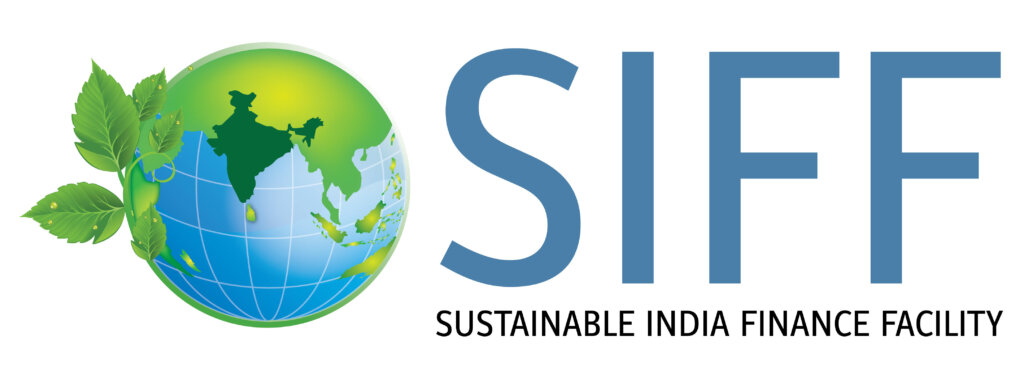Careers at SIFF
SIFF Fellowship Programme
About Us
India needs approximately USD 2.5 trillion by 2030, or roughly USD 300 billion per year, in green
finance to meet its climate commitments under the Paris Agreement. More than USD 10 trillion is
needed to achieve net-zero emissions by 2070. However, the current tracked green finance falls
woefully short of what is needed to meet India’s climate goals. The Sustainable India Finance
Facility (SIFF) recognises the critical role that private capital can and should play in this area so
that India can meet its development and climate goals on schedule.
SIFF is a virtuous not-for-profit partnership established in 2017 with catalytic support from the
United Nations Environment Programme (UNEP), World Agroforestry Centre and BNP Paribas to
leverage private finance for public good into sectors such as sustainable agriculture, biodiversity,
freshwater, fisheries, renewables, and forest protection. Currently, SIFF is hosted by the Global
Alliance for a Sustainable Planet (GASP).
Currently, SIFF supports the Government of Andhra Pradesh (GoAP), India, in its pioneering
Community Managed Natural Farming (APCNF) programme to transition 6 million farmers from
synthetic chemical farming to regenerative agriculture. As part of the programme, SIFF, in
partnership with the Rythu Sadhikara Samstha (RySS) of GoAP, runs a one-year fellowship
programme that offers imaginative young minds an opportunity to work in India and contribute to
sustainable development, path-breaking research, communications and stakeholder
engagement.
About the Fellowship
The SIFF India Fellowship is a one-year career development programme for bright young minds
to strengthen and sharpen their research skills and critical thinking of the Indian agrarian & food
systems and rural development, empowering them with a deep understanding of sustainable
development. Through field immersions and mentorship, the fellows choose their research topics.
They are given complete on-field and desk research support to produce a high-quality research
output that can contribute to the larger programme of scaling-up regenerative agriculture practices
and enhancing sustainable food systems in India.
Main Pillars of the Fellowship
Field Immersion: The fellowship will commence with a two-week field immersion tenure
dedicated to different development interventions by the Andhra Pradesh Community Natural
Farming Program. These interventions include a range of social and environmental solutions in
the field of regenerative agriculture, carbon sequestration, livelihood, community development,
women and youth empowerment, water, health & hygiene, sanitation, and communications. At
the end of the immersion tenure, each fellow will choose a topic for their research project based
on their interest and expertise. Research projects will focus on areas such as conservation, strategic communications, biodiversity, energy, subsidies, market off-take, and innovative
finance for agriculture.
Mentorship: During the fellowship, each fellow will be mentored by the thematic lead of the topic
selected for the research. The fellows will lead their own data collection and research but will get
complete on-ground support from the field mentors, community workers, farmer champions, and
all other relevant stakeholders. The fellows will be given several opportunities to attend various
national and international conferences and workshops on topics related to their research under
the broader domain of regenerative agriculture.
Research: Over one year, each fellow will be expected to select a research topic, collect the
relevant primary and secondary data, analyse the results, and produce a high-quality written
report. The report will be reviewed by internal and external subject experts and presented to the
senior officials of the program. The entire research will be supported and overseen by the head
of the research department.
Fellowship Requirements
1. Applicants must be enrolled in a degree programme in a graduate school (a higher degree from a university like a master’s or a further degree like a PhD/MPhil) at the time of applying and during the Fellowship or (b) have just completed a higher-level programme and are keen to acquire experience in project implementation, research and sustainability.
2. Your academic subject MUST relate to either of these areas: – environment, ecology, public policy, development studies, rural development, sustainable agriculture, food sciences, agri-economics, management, business development.
3. Your work experience, if any, should also be in any of the above-mentioned fields.
4. Project work done during the course in these subject areas or any full-time work experience in these areas would be given preference. Hence, please update your CV accordingly.
Stipend
Fellows receive a monthly stipend of INR 40,000 and all travel expenses reimbursement to cover the field visits and other training.
Fellowships are for a period of 12 months.
Assessment
No formal exam will be conducted at the end of the fellowship. However, a comprehensive
assessment will be conducted during the tenure of the fellowship based on feedback from the
field mentors and thematic leads. Each fellow must submit their research report at the end of the
fellowship.
Upon completion of the fellowship, all fellows will be formally awarded a completion certificate
and recommendation letter. The fellows can always seek counselling from their mentors and other
experts for their post-fellowship professional career.
What will you gain?
- An opportunity to learn from experts at RySS, UN, World Agroforestry (ICRAF) and beyond
- Hands-on work experience on diverse issues within sustainability, including a path-breaking sustainable system-scale smallholder agriculture project in Southern India
- Practical experience in the food-water-energy-ecosystem nexus
- Real-world understanding of the strategies that can support the efforts of national/local governments to achieve inclusive growth and enhance their linkages with the UN Sustainable Development Goals (SDGs), Agenda 2030 and the Paris Agreement.
How to apply?
The fellowship is open all year round, and candidates can apply at any given time.
Those interested should submit the following:
a. Updated Resume
b. Short essay (500 words) stating their motivation to apply for this Fellowship
c. Application form (attached below)
